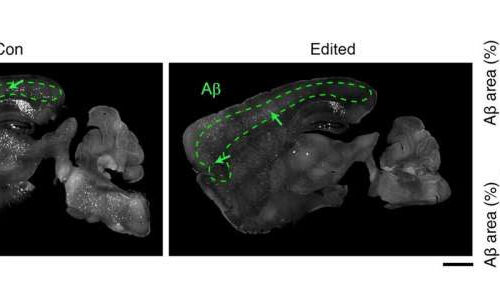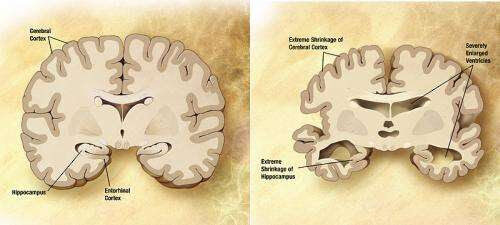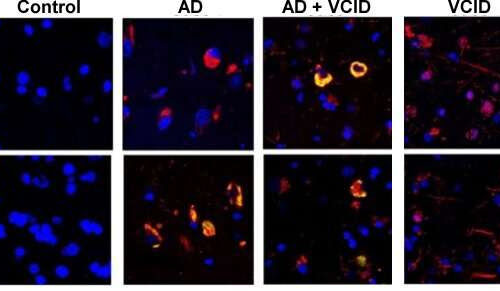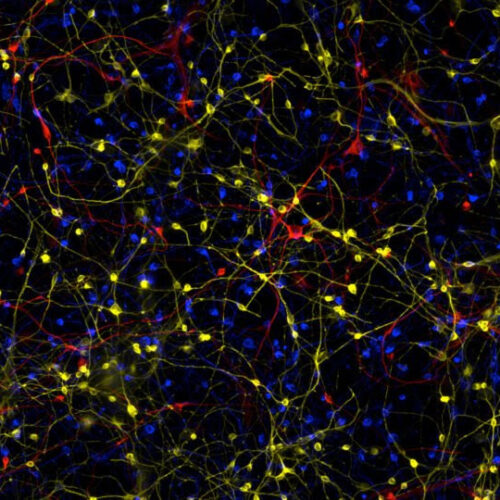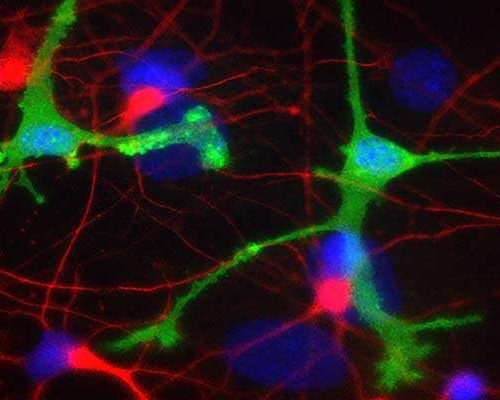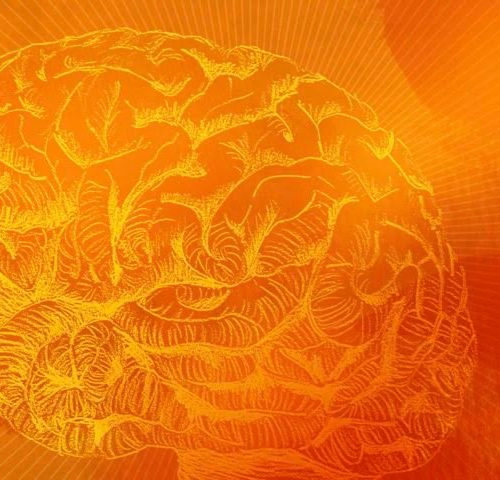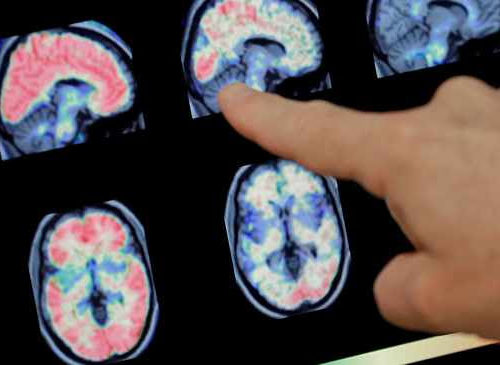by Hong Kong University of Science and Technology The level of amyloid (white shades in area encircled by green dotted lines) – the protein thought to drive neurodegeneration in AD, is high in the brain of AD mouse (left) and reduces after the administration of the genome editing therapy throughout the brain (right). Credit: HKUST An...
Tag: <span>Alzheimers</span>
Do some diabetes drugs reduce the risk of Alzheimer’s?
by American Academy of Neurology Diagram of the brain of a person with Alzheimer’s Disease. Credit: Wikipedia/public domain. People taking certain drugs to lower blood sugar for type 2 diabetes had less amyloid in the brain, a biomarker of Alzheimer’s disease, when compared to both people with type 2 diabetes not taking the drugs and people...
Forget me not: Novel target shows promise in treating Alzheimer’s and related dementias
by Matthew Greseth, Medical University of South Carolina The cytotoxic tau isomer (cis P-tau; red) is partially colocalized with tau oligomers (green; top) and tau tangles (green; bottom) in Alzheimer’s disease (AD) and mixed AD and VCID brains but was detected in the absence of other tau isoforms in VCID brains. Credit: Image provided by Dr....
Salk scientists reveal how brain cells in Alzheimer’s go awry, lose their identity
New technique models brain cells in older patients more accurately than ever before Despite the prevalence of Alzheimer’s, there are still no treatments, in part because it has been challenging to study how the disease develops. Now, scientists at the Salk Institute have uncovered new insights into what goes awry during Alzheimer’s by growing neurons...
Study shows flickering lights and sound could be new weapon against Alzheimer’s
by Georgia Institute of Technology Annabelle Singer. Credit: Georgia Institute of Technology For the past few years, Annabelle Singer and her collaborators have been using flickering lights and sound to treat mouse models of Alzheimer’s disease, and they’ve seen some dramatic results. Now they have results from the first human feasibility study of the flicker treatment,...
PureTech turns 200-year-old discovery into a new approach to Alzheimer’s, while clinging to controversial amyloid hypothesis
April 28, 2021 11:12 AM EDT Updated 11:44 AM Discovery PureTech turns 200-year-old discovery into a new approach to Alzheimer’s, while clinging to controversial amyloid hypothesis Before MRIs or CT scans, 18th-century anatomist Paolo Mascagni injected his cadavers with mercury. Ever mobile, the mercury coursed through their veins like blood, illuminating the body’s rivers and...
Salk scientists reveal how brain cells in Alzheimer’s go awry, lose their identity
SALK INSTITUTE IMAGE: THIS IMAGE IS A COMPOSITE OF INDUCED NEURONS (BRAIN CELLS) FROM DIFFERENT INDIVIDUALS WITH ALZHEIMER’S DISEASE. CREDIT: SALK INSTITUTE LA JOLLA–(April 27, 2021) Despite the prevalence of Alzheimer’s, there are still no treatments, in part because it has been challenging to study how the disease develops. Now, scientists at the Salk Institute...
Experimental antibodies for Parkinson’s, Alzheimer’s may cause harmful inflammation
by The Scripps Research Institute Scientists at Scripps Research find evidence that antibody treatments in clinical trials for neurodegenerative diseases may trigger an inflammatory response that erodes their positive effects. Pictured: Dopaminergic neurons in red and microglia in green. Credit: Lipton laboratory, Scripps Research A team led by scientists at Scripps Research has made a discovery suggesting that experimental antibody therapies for Parkinson’s...
New Brain Sensor Offers Answers about Alzheimer’s
Scientists at the University of Virginia School of Medicine have developed a tool to monitor communications within the brain in a way never before possible, and it has already offered an explanation for why Alzheimer’s drugs have limited effectiveness and why patients get much worse after going off of them. The researchers expect their new method will...
The eyes could show early warnings for Alzheimer’s, researchers say
By The Washington Post 21h ago Washington – Forget the soul, it turns out the eyes may be the best window to the brain. Changes to the retina may foreshadow Alzheimer’s and Parkinson’s diseases, and researchers say a picture of your eye could assess your future risk of neurodegenerative disease. Pinched off from the brain during embryonic development, the...

